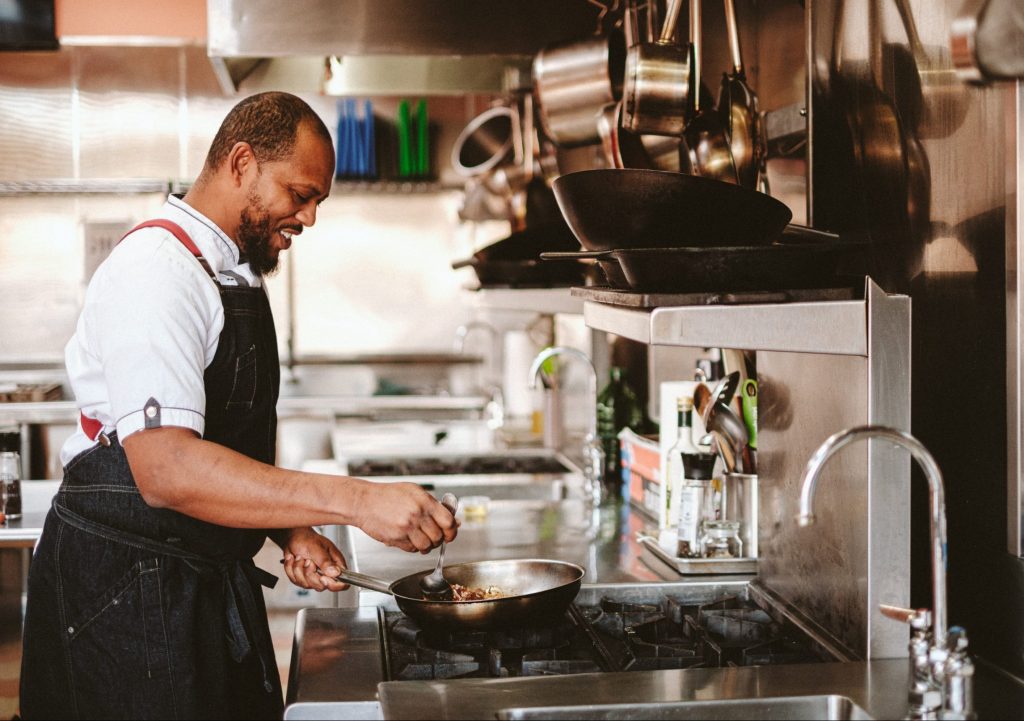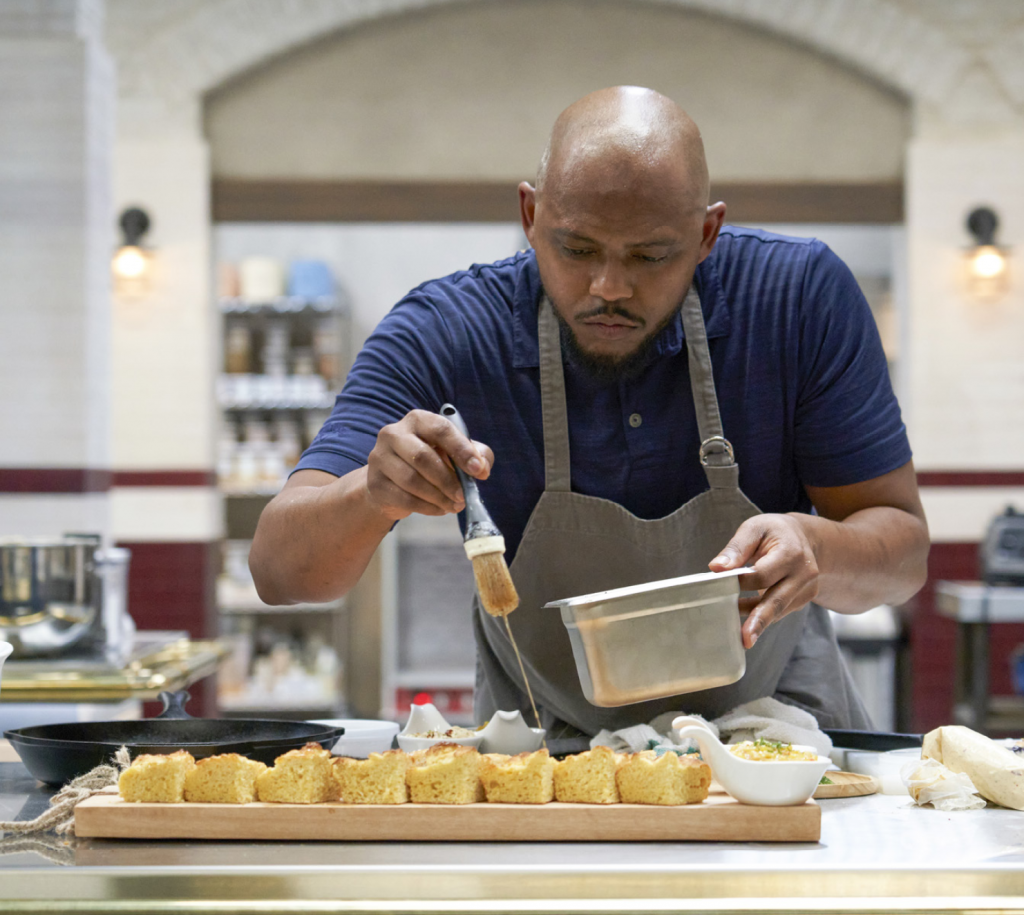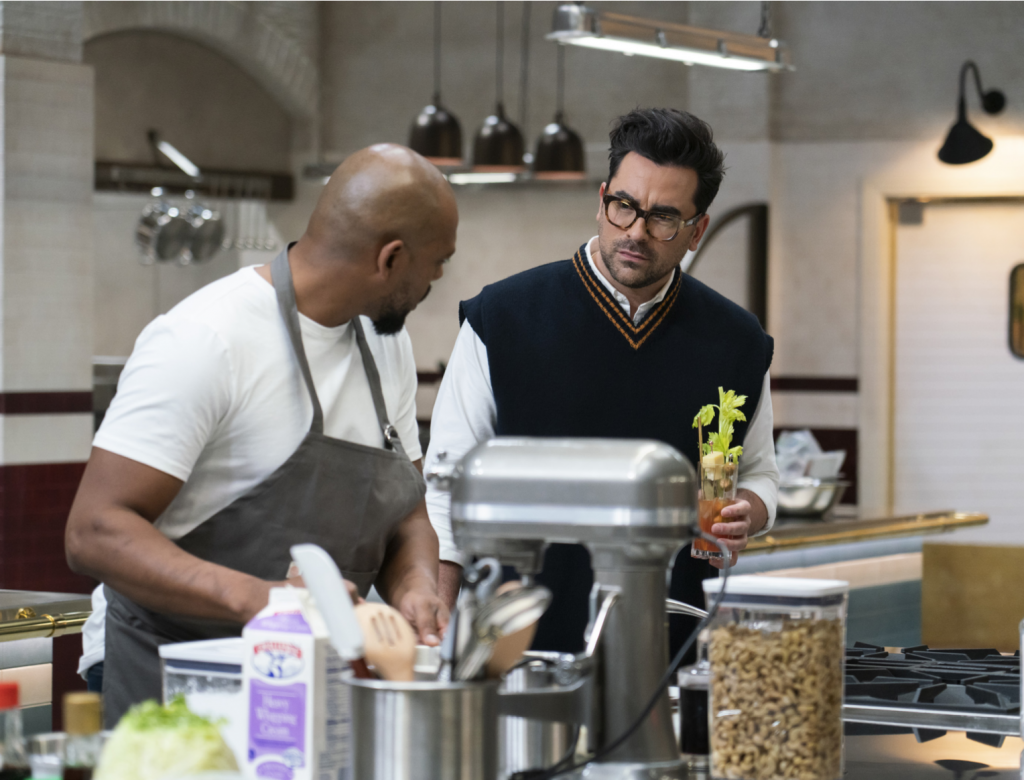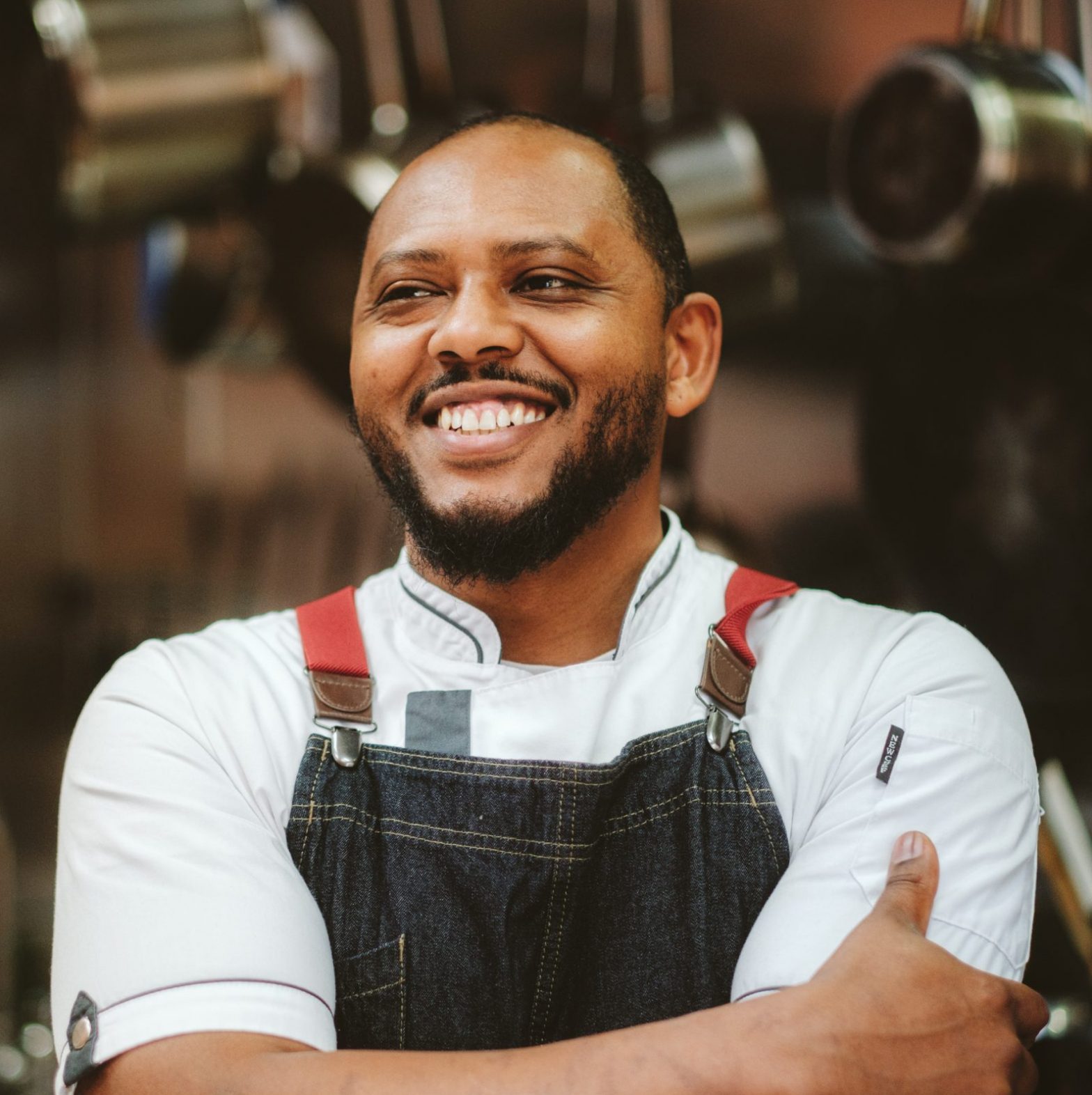The first episode of “The Big Brunch” opens on chef Antwon Brinson. He stands almost in silhouette over a hot pan, stirring a sauce that coats some delicious-looking meatballs. Brinson is framed by his steel teaching kitchen, an everything-you-could-need creative cooking space at his business Culinary Concepts AB, located just off Barracks Road. In this HBO Max reality series, Brinson’s voice is the first we hear: “As a chef, you wear three hats. You’re a mentor, you’re a coach, and then you’re a chef.”
That balance is a guiding principle for Brinson, whose culinary career has shifted from navigating the precise world of fine dining to running his five-week cooking program in Charlottesville. The bootcamp at Culinary Concepts AB is a cooking crucible that prepares novices and experts alike for a career in the restaurant industry, meeting a tangible need for qualified staff in town. But the culinary bootcamp does more than just teach students how to dice and sauté; it teaches them how to set goals and meet them.
“I want you to walk away from this and feel like, ‘I’ve learned a lot about myself. And I feel confident going out into the workforce and with the skills that I’ve gained here,’” says Brinson. “And it may not even be cooking, it may be something else, but you found yourself through this journey.”

Brinson embarked on a new journey himself when he joined the inaugural cast of “The Big Brunch,” a new cooking show executive produced and hosted by Dan Levy that premiered last fall. The competition’s variously themed challenges tested Brinson’s culinary acumen by asking him to cook in a totally unorthodox way.
“When you think about cooking, you think about cooking from the context of, ‘What cuisine am I gonna cook? What protein am I gonna use? Is this a vegetable dish? Is it a seasonal menu?’” says Brinson. “You don’t think about cooking from the perspective of, ‘A dish that inspired you through your childhood,’ or, ‘A dish that speaks to where you are currently on your journey.’”
Those sort of abstract directives center each episode of “The Big Brunch,” which, true to its name, tasks contestants with reimagining brunch through their own personal lens—first with a starter item, and then with the main course.
“It challenged all of us to cook from a place that none of us had ever cooked from before,” says Brinson.
In that first episode, we meet chef after chef from across the country: a proud cook of Cantonese cuisine from Asheville, North Carolina, a sprightly Long Island baker, a vegan auteur from El Paso, a self-taught Richmond restaurateur, and on and on. There are 10 in total (three from Virginia!), and it’s clear from the moment we meet the judges that these earnest chefs will be duking it out for cash—$300,000, in fact.
But this isn’t “Chopped,” despite the tears shed each episode. “The Big Brunch” is a big love-fest, a celebration of the art of cooking that specifically centers each chef’s community-focused passion project as the beneficiary of the grand prize. The leisurely timed hour-long episodes encourage the audience to get to know each chef, to learn about their drive and ambition and identity. And the production of the show allowed the chefs to get to know each other better, too.
“I would have never imagined that I would go on a show and meet people and say they’re gonna be my friends for the rest of my life,” says Brinson. “We’re cooking from a place of, ‘I want to change my community, I want to make this industry better.’ … To be in a room with nine other contestants that feel the same way that you do about their community, and they’re expressing themselves with food that way, it was remarkable.”

As the competition heats up and contestants get eliminated one by one, it’s evident the chefs are competing not against each other but against themselves. Each one has a comfort zone—like a tried and true banana bread or a predilection for mushrooms. Judges Levy, Sohla El-Waylly, and Will Guidara sniff this out quickly, and steadily push the chefs to refine or expand their repertoire. In one brunch, the contestants play a challenge so safely that the judges call a mulligan and order them to start over from scratch, to really push themselves. As a result, the contestants return with dishes so outstanding the judges can’t bear to eliminate anyone. “That was a comeback for the ages,” says Guidara.
It’s in that same episode that Brinson very publicly embraces his love for Ethiopian food, a cuisine he cooks regularly at home but has shied away from professionally.
“In my career as a chef, in all the places that I’ve worked, I’ve never put Ethiopian food on the menu. Never,” he says in an interview segment on the show. “It was fear. ‘It’s not familiar. Will the guests like it?’ And being here, this competition has really helped me grasp an identity.”
“I love learning about my culture because I didn’t grow up with it,” Brinson told C-VILLE. “So I just started cooking Ethiopian food on HBO. … That’s what they [the judges] were able to do, they were able to pull this out from all of us, had us all cooking from a place of vulnerability.”
Originally from Niagara Falls, New York, Brinson says he didn’t grow up thinking he would be a chef. He didn’t have a strong culinary presence at home—but he did know that when his grandmother was baking desserts for the holidays, it brought the whole family together. He found that food was an equalizer: It’s at the center of many memorable moments in his life. That belief in the unifying power of food led him to join his high school’s cooking team (where he made it to state competition on his first try), and eventually to the Culinary Institute of America, where he refined the skills he would use as a high-end chef in kitchens from the Virgin Islands and Hawaii to Palm Springs and San Francisco. His latest stop in Charlottesville saw him take on the role of executive chef at Common House, before leaving the restaurant biz entirely to open his cooking school.
Throughout his travels, Brinson held tight to the adage that food helps people connect and build communities. He immersed himself in each location’s culture to become a better chef—“I knew that if I understood the culture it would give me a profound understanding of the cuisine,” he says—which means he learned to cook food from a wide variety of culinary traditions. He came to “The Big Brunch” confident that he could pull a range of recipes from his pocket at a moment’s notice, but the competition’s time crunch and increasingly abstract expectations actually had him cooking much like he does at home: in a freeform, improvisational way.

At home, Brinson opens the refrigerator without a plan, and takes stock of what he can cook with and what he can salvage from leftover ingredients. It’s an experience that he says harkens back to his youth, when his mother always seemed to be missing one key ingredient he’d need to make a sandwich. He made do, and his quick thinking served him well on HBO Max as the timer marched on.
“Challenge three, the farm-to-table challenge, is really where I just changed,” says Brinson. “The challenge was, like, cook one vegetable. And I just literally went ham. I had four or five different techniques on the plate, I had mushrooms throughout it with different textures. … In that moment, I realized, I’m just gonna fucking cook. I’m gonna stop trying to dig deep. What is the food saying to me? What do I feel in this moment? And that’s what I’m gonna go with. That’s what got me through the competition.”
Though there are similarities between how Brinson cooks on TV and how he cooks at home, his tenure on “The Big Brunch” was anything but familiar. Cameras swooped around him as he prepared his dishes, and interview questions flew at him fast while he was working. He and the contestants were urged to only interact on set, so that their most authentic thoughts and feelings could be captured raw. And after each brunch, the chefs were subjected to 15- to 20-minute critiques (often shortened to barely 30 seconds in the show).
There’s no TV magic on “The Big Brunch”: Each episode is a truncated version of a 12-hour shoot, and every dish served up is exactly representative of what the chefs were capable of in that challenge. Things can and do go wrong, and when Levy rings the bell to signal everyone to stop cooking, the chefs better be ready to present whatever they have—even if it’s missing ingredients or portions.
“You got one shot,” says Brinson. “You literally have one shot to nail it. If you fuck it up, well, that’s what you get.”
As much as he enjoyed the experience, the Charlottesville chef isn’t dying to get on another cooking show.
“I was gone for a month,” he tells me, sitting at a table in Culinary Concepts AB. Brinson is surrounded by the stations that his students use in culinary bootcamp, the same kitchen that we see him cooking and teaching in at the beginning of the show. “I think that if I was to do another cooking show it would have to be more focused around what I’m currently doing, it has to be in line with my mission. Something that highlights the work, something that highlights the students, something that really highlights the outcome. I would want it to be less about me and more about the inspiration that happens when you create a space like this.”
Brinson’s dedication to his new role as a business owner and teacher is an outgrowth of the tireless, laser-focused work ethic that powered him through his career in high-end resorts. He draws considerable inspiration from his mother, who was a foster parent while he was growing up.
His mom suffered from back pain, but “then she gets a foster kid that’s an emergency placement that could possible die because they’re on a ventilator,” says Brinson, “and all of a sudden she has no back pains, anything, and she is determined to make sure this kid makes it through the night.” Her hyperfocus and vigilance continues to inspire the chef to “find a focal point and go hard,” a lesson he passes on to his students.
“What we’re doing here, man—restaurants and food service providers all around the world need something like this,” says Brinson. “People need something like this. And our goal is to scale this thing across the nation. And that’s the vision.”
Want to see how Antwon Brinson did in the competition? Check out “The Big Brunch” on HBO Max, where all episodes now streaming.
